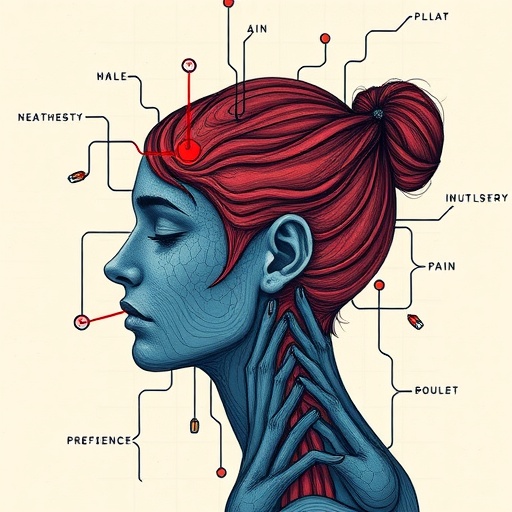Chronic pain is a debilitating condition that affects millions globally, yet its psychological underpinnings remain only partially understood. A groundbreaking observational study conducted by researchers at Murdoch University has shed new light on the intricate relationship between chronic pain, perfectionism, and self-compassion, offering fresh perspectives on the psychological mechanisms that may influence pain management and quality of life. This research is a significant leap towards integrating psychological resilience factors into chronic pain treatment protocols.
Dr. Graeme Ditchburn, a leading figure at Murdoch University’s School of Psychology, spearheaded the investigation, which uniquely compares individuals living with chronic pain to those without such conditions. The comprehensive study involved over a thousand participants, encompassing adults between the ages of 18 and 65. Participants with chronic pain reported persistent discomfort lasting longer than three months, explicitly excluding cases related to cancer or acute wound healing, thus focusing on a stable chronic pain population.
A pivotal finding of the study was the profound association between chronic pain and elevated levels of perfectionism. Perfectionism, defined as the relentless pursuit of flawlessness and excessive self-criticism, appears to exacerbate the stress experienced by chronic pain sufferers. This insight suggests that the cognitive and emotional burden of perfectionist tendencies can intensify the perception and psychological impact of pain, potentially complicating coping strategies and treatment outcomes.
Conversely, the study revealed a marked decrease in self-compassion among those with chronic pain. Self-compassion involves treating oneself with kindness and understanding, especially in the face of failure or hardship. The diminished capacity for self-compassion may amplify feelings of inadequacy and self-blame in patients, which, as the research elucidates, correlates with increased stress and diminished self-efficacy—the belief in one’s ability to manage life’s challenges effectively.
Dr. Ditchburn explains that the interplay between perfectionism and reduced self-compassion creates a psychological environment ripe for heightened stress responses, which are known to have deleterious effects on both physical and mental health. Chronic stress activation can exacerbate pain perception and impair immune function, creating a vicious cycle that perpetuates suffering and disability.
The dataset highlighted that chronic pain sufferers often confront frustration stemming from daily functional limitations. This frustration frequently leads them to push themselves toward unattainably high personal or external goals, reinforcing maladaptive perfectionist standards. The internalization of these unrealistic expectations further diminishes psychological resilience, making it harder for individuals to adapt to their pain realities with flexibility and self-kindness.
Importantly, the research underscores the social dimension of chronic pain management, noting that individuals may feel pressured by perceived expectations from others. This social stressor can exacerbate perfectionist tendencies and reduce self-compassion, suggesting that the social environment plays a crucial role in the psychological experience of chronic pain.
Through detailed psychological assessments, the study confirms that individuals with chronic pain often harbor fears of judgment and self-criticism that compound their suffering. These fears can result in patients interpreting their pain and its burdens as personal failures, thereby undermining their self-efficacy and willingness to engage in adaptive coping behaviors or seek support.
The researchers advocate for clinical interventions that specifically target these psychological dimensions. Enhancing self-compassion and addressing perfectionistic thoughts through cognitive-behavioral strategies or mindfulness-based interventions may alleviate stress and improve pain management outcomes. Such interventions could promote greater psychological flexibility, reduce self-criticism, and ultimately enhance patients’ quality of life.
Additionally, the study highlights the need for future research to dissect how different types of chronic pain conditions and the extent of functional impairment relate to these psychological variables. This stratified approach could allow for more tailored and effective psychosocial interventions, recognizing the heterogeneity of chronic pain experiences across individuals.
Published in the prestigious journal Psychology and Health, this research contributes to a growing body of evidence supporting the biopsychosocial model of chronic pain. It emphasizes that addressing psychological traits such as perfectionism and self-compassion is not merely ancillary but central to comprehensive pain management. Such insights could revolutionize therapeutic frameworks by integrating psychological well-being as a core treatment target.
The study’s robust methodology, including its sizable cohort and comparative design, lends credence to its findings and facilitates broader generalization. While observational, these results set the stage for controlled trials assessing the efficacy of tailored psychological interventions in chronic pain populations, potentially influencing clinical guidelines worldwide.
In sum, the Murdoch University study brings hope to the many living with chronic pain by illuminating psychological pathways that can be modified to reduce suffering. By fostering self-compassion and tempering perfectionism, individuals might unlock greater resilience against the relentless challenges of chronic pain, demonstrating that sometimes, the most potent medicine lies within how we treat ourselves.
Subject of Research: People
Article Title: Perfectionism, self-compassion, and general self-efficacy between those with and without chronic pain
News Publication Date: 31-Aug-2025
Web References:
Murdoch University Profile of Dr. Graeme Ditchburn
Murdoch University’s School of Psychology
Full Study in Psychology and Health
DOI Link
Keywords:
Pain, Chronic Pain, Perfectionism, Self-Compassion, Self-Efficacy, Psychological Science, Personality Psychology, Health and Medicine, Symptomatology




